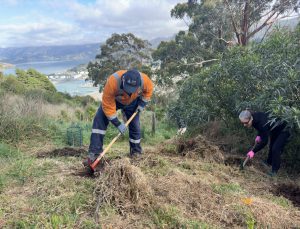
The Banks Peninsula Conservation Trust (BPCT) has its sights set on the 2050 Ecological Vision for Te Pataka o Rakaihautū Banks Peninsula (including the Port Hills). As the principal sponsor, LPC is committed to the journey.
The recently refreshed vision has two new ecological goals, totalling 10.
These goals provide a roadmap and cover pest management, ecosystems, and protection of indigenous flora and fauna, among others.
BPCT General Manager Maree Burnett says the organisation has grown significantly in the last five years, and the trust is currently running seven programs of work – one of these being habitat protection.
“We currently have 101 covenants in place over the Banks Ecological Region covering 1609ha in total,” says Maree.
This includes the covenant LPC signed to protect 11.4 hectares of land above Gollans Bay Quarry.
Another section of work has been volunteer programs the trust runs.
“The hugely successful partnership around the Port Saddle continues to provide significant community benefits as the area’s biodiversity is enhanced through ecological restoration.”
At this year’s annual planting day, volunteers planted 300 trees on the saddle.
The relationship between LPC and BPCT is significant to both parties.
“Over the years, as an organisation, we have got really confident that the Port has some clear goals around sustainability and is taking a particular interest in indigenous biodiversity. I think it makes for a really natural partnership.
“There is no doubt that the financial contribution is significant to the trust; the multi-year support provides us certainty and allows us to cover some of our operational costs, which gives us the structure to complete the range of work.
“The Port Saddle and Gollans Bay are great examples of how we can also partner in a meaningful way on the ground to deliver projects that are beneficial for the community and have a positive biodiversity outcome.”
While Maree says all the projects are inspirational in their own way, the best part of the job is the people she engages with.
“Everyone we work with without exception is a wonderful person trying to do good things – which makes it enormously positive.
“Whether that’s a school child engaging in the education program, a landowner who wants to protect an original forest remnant for future generations, or a Lyttelton resident who is excited because they have seen a tui in their garden for the first time.”
Maree says the community’s dedication is encouraging, and the trust continues to welcome support from the locals.
“Through experience, we know that the Banks Peninsula community really cares about their natural environment. Certainly, any support that people can offer the trust is well received in terms of volunteer contributions and one-off/ongoing donations.”
To learn more about Banks Peninsula Conservation Trust, check out their website here, where you can sign up for their newsletters.
Read more on the seven programs below:
Habitat protection
Delivered through conservation covenants, a legal agreement with landowners to provide a legacy and gift of indigenous biodiversity for future generations through perpetual protection.
Volunteer programme
Thousands of volunteer hours contributed to restoration work on multiple sites around the peninsula. They worked with schools, corporate groups, non-profit groups, and community members.
Tui translocation
Two populations of tui were translocated over ten years ago. A highly successful community monitoring programme continues for the tui, and 18,290 community observations of the birds have been reported. There are now well more than 200 banded birds, which allows easy identification of individuals and modelling of the population growth.
Biodiversity hubs
The trust is currently working on three hubs, at least 1000 hectares of contiguous habitat, that are legally protected and collaboratively managed for biodiversity outcomes. These hubs will include summit-to-sea protection and help support species susceptible to the impacts of climate change.
Pest-free Banks Peninsula
The trust facilitates the work agreed upon by 14 partners to remove pests from the peninsula to a level that no longer impacts biodiversity. This includes possums, mustelids, feral cats, goats, and feral pigs.
A recent highlight was after years of a collaborative effort by the Trust, Christchurch City Council, Department of Conservation, Environment Canterbury and landowners; feral goats have been wholly removed from Banks Peninsula up to Gebbies Pass.
Community engagement and education program
Working with almost all the schools in the peninsula, landowners, and the public. Supporting the learning about biodiversity and unique treasures found on the peninsula.
Farm biodiversity support program
A new program that is just launching, the trust is looking to make support available for every farmer on the peninsula around planning for biodiversity management.